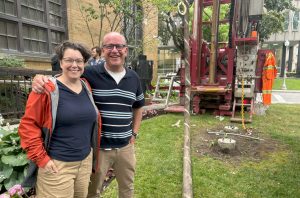The Aukbu family, refugees from Eritrea, are Christian but they are celebrating a miracle worthy of Hanukkah with the Montreal synagogue that has made their resettlement in Canada possible.
Congregation Shaar Hashomayim welcomed Shewit and Molu, their daughters Salim, 12, and Bat El, 8, and six-month-old son Abiyel, who they will be sponsoring for a year, when they arrived at Trudeau Airport on Dec. 12.
The couple resided for about 15 years in Israel where, like tens of thousands of African migrants who made their way there during the mid-2000s, they lived in legal limbo due to a controversial policy that has granted extremely few asylum.
With their economic opportunities limited in Israel, the Aukbus wanted to find a permanent home elsewhere.
Exactly four years ago, the Shaar applied to sponsor the family’s immigration to Canada, hoping the fact that Shewit had a brother who had successfully resettled in Montreal two years earlier from Israel would expedite the process.
It was not to be. The Shaar’s Rabbi Adam Scheier, who has been instrumental in realizing this project, said intricate paperwork and frequently delayed procedures had to be gone through before getting approval from Canadian officials a few weeks ago.
Rabbi Scheier knew of the Aukbus’ plight a couple of years before he persuaded the Shaar’s trustees to undertake their sponsorship.
To him, helping this family is more than a mitzvah, it’s a privilege, and a reminder to all in a position of good fortune to extend a helping hand. “This means a huge change in their life. For the first time, Shewit and Molu can see a future for their children.”
Their story is typical of those who fled Eritrea. They were living under a brutal dictatorship and Molu faced conscription that was open-ended, compared to forced labour, and would involve him in ongoing conflict with neighbouring Ethiopia.
Migrants like Shewit and Molu experience hardship and danger in their escape from Eritrea, said Rabbi Scheier, going on foot to United Nations refugee camps in Ethiopia. They make it, usually with smugglers, to Sudan and Egypt’s Sinai Desert where they walk over the Israeli border.
Although not granted refugee status by Israel, the family was under “temporary protection,” which allowed them to stay and work making a modest living cleaning schools and synagogues, Rabbi Scheier said.
They do not speak English or French, so their integration into Quebec will take time.
Their daughters are very much Israelis, he said. They speak a “beautiful” Hebrew, are attuned to the country’s pop culture, and no strangers to Jewish tradition, so they are enjoying Hanukkah for the first time against a snowy backdrop.
Rabbi Scheier learned of the Aukbus’ situation in 2011 when he became reacquainted with a former classmate from rabbinical school while he was on a sabbatical in Israel. Udi Cohen ran a preschool in Jerusalem, which the rabbi’s daughters attended, that had a dedicated class for children of asylum seekers and undocumented workers—“those who might otherwise fall through the cracks of society, but were provided a quality education as a result of this initiative.”
Later, the two Aukbu girls would attend the class.
In 2016, Cohen introduced him to Shewit’s brother Efrem Tekie Tefsa, who had recently settled in Montreal from Israel, where he had sought asylum. He had been a volunteer in the special class at Cohen’s preschool.
The two became friendly and in 2018 Tefsa approached Rabbi Scheier about sponsoring his sister and her family as refugees to Canada. In the intervening years, Rabbi Scheier visited the family several times in their sixth-floor walkup in Jerusalem on King George Street and kept in contact otherwise through WhatsApp.
No one in the Aukbu family had ever flown before, which made their journey here all the more exhilarating.
Rabbi Scheier and Tesfa went to Toronto’s Pearson Airport where the family made their initial landing in Canada before flying on to Montreal. The family’s reunion was moving to witness, Rabbi Scheier said, and the family’s joy as Montreal came into view, its lights twinkling, was truly emotional.
At Trudeau Airport, a delegation from the Shaar was on hand even though it was around midnight, including kids from its school and youth programs who held welcoming signs, flowers and balloons, and cheered and sang as the dazzled family arrived.
Now the work has begun to get the family on its feet over the next 12 months. They are staying in Tesfa’s apartment, while synagogue members get their own apartment ready and assist with the governmental nitty-gritty from getting social insurance numbers to enrolling in integration classes.
“We are eager to welcome them to our country and will do everything in our power to make their lives here successful,” Rabbi Scheier said in a memo to congregants. “A small but devoted committee has been hard at work preparing for their arrival, working on everything from housing to clothing to schooling arrangements to employment opportunities. Our undertaking obligates us to support them during their acclimation period and to remain a helpful resource to them as they pursue Canadian citizenship.”
A fund called Shaar Cares is accepting monetary donations for rent subsidies, food, phones, transportation and other essentials. Donations of goods and services are also needed, including furniture, housewares, new clothing, especially for winter, toys, baby items, electronics, and personal care products.
While the family will be covered by the provincial health system, they must find doctors and dentists. Volunteers are being mobilized to introduce the family to the city and get them acculturated. Young families are being encouraged to include the Aukbus in their activities. Some members have prepared meals that can be frozen.
Rabbi Scheier and his wife, Rabbi Abby Brown Scheier, have already had the family at their house, and Salim and Bat El had a wonderful time cooking and baking challah with their five daughters.
“They felt right at home,” he said.







